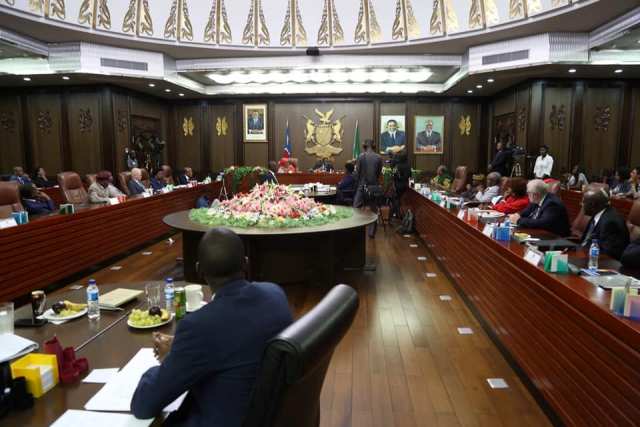 President Hage Geingob delivers the statement of the first cabinet meeting in February 2020. [photo: President Geingob on Facebook]
President Hage Geingob delivers the statement of the first cabinet meeting in February 2020. [photo: President Geingob on Facebook]
[This is an excerpt from an article in The Round Table: The Commonwealth Journal of International Affairs.]
Introduction
The South West African People’s Organisation (SWAPO of Namibia) has performed exceptionally well among the liberation movements as governments. ‘One Namibia, one nation’ and ‘SWAPO is the nation and the nation is SWAPO’ were two of the struggle slogans. They translated in the false equation that the party is the government and the government is the state. In November 1989, the first democratic elections for a Constituent Assembly took place under the supervision of the United Nations. Since then, every 5 years elections for a National Assembly and the country’s President were held. In November 2014, SWAPO scored 80% of votes. Its presidential candidate Hage Geingob came close to 87% of votes. As these figures document, the political hegemony had been firmly in place for almost 30 years. SWAPO’s patriotic narrative remained rooted in the official discourse and daily political culture. But the electorate gradually changed. The ‘born free’ has become a relevant factor, while the party displayed a growing gerontocratic structure. It remains firmly embedded in ‘struggle credits’, though the first generation is more and more replaced by the second struggle generation.
The wear and tear, exacerbated by an economic crisis, also had its effects. The country entered a recession in 2016, with devastating effects on the socio-economic realities. With unemployment on a steady increase, it was approaching in the age group under 35 almost 50%. For respondents to the latest Afrobarometer survey, unemployment was the most important matter (54%). Drought (30%), poverty (21%), education and water supply (20% each) followed. Corruption (16%), land (13%) and crime (11%) ranked surprisingly lower. As the local Institute of Public Policy Research (IPPR) concluded in its third Quarterly Economic Report for 2019:
With elections now on the horizon, the current President and Cabinet must decide what their legacy is going to be: will they reform and reverse the decline of the past five years or go down in history as the people who crashed the Namibian economy?
Hiccups ahead of the poll
New political parties, even when created by SWAPO dissidents, never managed to establish a sustainable alternative. They snatched votes from other opposition parties to become irrelevant later on. This time, the new kid on the block is the Landless Peoples’ Movement (LPM). It was founded after a fall out of the deputy minister of land with the party over the land policy and emerged as a force to reckon with in the sparsely populated areas South of Rehoboth. But as so many other of the existing parties its basis was almost exclusively rooted in a particular regional-ethnic stronghold among the Nama communities.
More challenging than the party competition became the direct election of Namibia’s next president. In a surprise move, the SWAPO member Panduleni Itula registered as ‘independent’ candidate, using a loophole in the country’s electoral act. He adamantly claimed to have the right to challenge the official party candidate as an alternative and remained defiant to leave SWAPO, using the analogy of a family feud, which still allows you to stay in the family while seeking solutions. SWAPO-internal factionalism and divide over the leadership issue seemed indeed a significant factor triggering this rivalry. Itula had not disclosed the sources funding his campaign and thereby fuelled speculations further. Not surprisingly so, President Geingob was not amused.
Geingob also reacted thin-skinned to media reports covering corruption scandals. He smelled ‘media sabotage’, undermining deliberately his credibility through ‘fake news’. Reports on a large-scale fraudulent fisheries deal made international headlines. The bombshell circulating since then as #Fishrot files disclosed massive fraudulent transactions bordering on state capture the Namibian way, involving the biggest Icelandic fishing company, two Namibian ministers and several other high-ranking officials.
While Geingob suspected that the timing of the disclosures was deliberate, an editorial in the weekly Windhoek Observer bemoaned: ‘Stealing public funds and misusing government resources are the natural state of affairs in Namibia.’ A documentary broadcasted by Al Jazeera only after the elections on 1 December disclosed further delicate details. Both SWAPO and Geingob, as well as the party’s and his personal lawyer, were implicated by the disclosures, with revelations that the lawyer serving the party and Geingob as personal client suspected of being a facilitator in money laundering. Meanwhile, in marked contrast to the grand-scale embezzlement, people are in Namibia killed over a tin of fish.
Given the crisis mounting at different fronts, the increased appeals by President Geingob to national unity indicated that the ‘one Namibia one nation’ mantra had shown signs of erosion. ‘Unity in diversity’ had moved further from reality than at any given time since Independence. Tirades in the social media testified to an utter disrespect for those in power and displayed insulting language of hitherto unknown proportions. For the first time after 30 years, due to several factors, elections were widely expected to be more than business as usual: ‘a stumbling economy, a surprise presidential candidate, and a major corruption scandal have combined to make these elections Namibia’s most competitive yet’.
Henning Melber is Extraordinary Professor, University of Pretoria, South Africa; Centre for Africa Studies, University of the Free State, Bloemfontein, South Africa.



